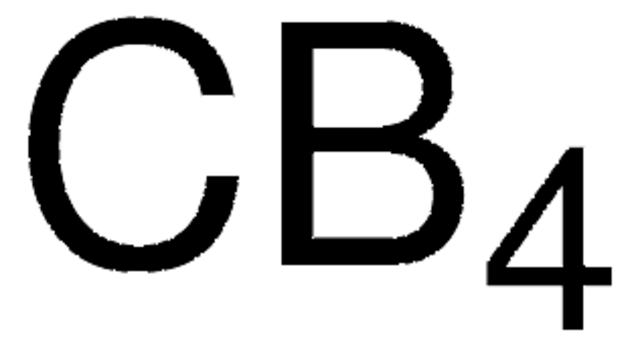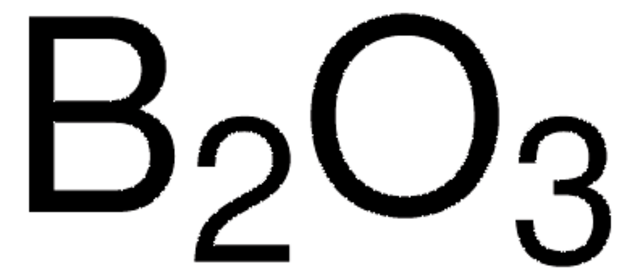333360
Boron
crystalline, −60 mesh, 99% trace metals basis
Sign Into View Organizational & Contract Pricing
All Photos(2)
About This Item
Empirical Formula (Hill Notation):
B
CAS Number:
Molecular Weight:
10.81
EC Number:
MDL number:
UNSPSC Code:
12141907
PubChem Substance ID:
NACRES:
NA.23
Recommended Products
Assay
99% trace metals basis
form
crystalline
resistivity
1.5E12 μΩ-cm, 20 °C
impurities
<0.5% carbon
particle size
−60 mesh
density
2.34 g/mL at 25 °C (lit.)
SMILES string
[B]
InChI
1S/B
InChI key
ZOXJGFHDIHLPTG-UHFFFAOYSA-N
Looking for similar products? Visit Product Comparison Guide
Storage Class Code
13 - Non Combustible Solids
WGK
nwg
Flash Point(F)
Not applicable
Flash Point(C)
Not applicable
Personal Protective Equipment
dust mask type N95 (US), Eyeshields, Gloves
Choose from one of the most recent versions:
Already Own This Product?
Find documentation for the products that you have recently purchased in the Document Library.
Customers Also Viewed
Tara A Devirian et al.
Critical reviews in food science and nutrition, 43(2), 219-231 (2003-04-23)
Boron may be an essential nutrient for animals and humans. Dietary boron influences the activity of many metabolic enzymes, as well as the metabolism of steroid hormones and several micronutrients, including calcium, magnesium, and vitamin D. Boron supplementation in rats
Yu Zhao et al.
Journal of the American Chemical Society, 135(4), 1201-1204 (2013-01-16)
Two kinds of boron and nitrogen co-doped carbon nanotubes (CNTs) dominated by bonded or separated B and N are intentionally prepared, which present distinct oxygen reduction reaction (ORR) performances. The experimental and theoretical results indicate that the bonded case cannot
Daniel L Silverio et al.
Nature, 494(7436), 216-221 (2013-02-15)
The discovery of catalysts that can be used to synthesize complex organic compounds by enantioselective transformations is central to advances in the life sciences; for this reason, many chemists aim to discover catalysts that allow for preparation of chiral molecules
Eliane Bezerra Cavalcanti et al.
Water research, 47(5), 1803-1815 (2013-01-29)
The electrochemical incineration of omeprazole, a widely prescribed gastrointestinal drug which is detected in natural waters, has been studied in a phosphate buffer of pH 7.0 by anodic oxidation with electrogenerated H(2)O(2) (AO-H(2)O(2)) operating at constant current density (j). The
Ewan Galbraith et al.
Chemical Society reviews, 39(10), 3831-3842 (2010-09-08)
This critical review will explore some of the recent research into the use of boron based anion receptors and focus on those receptors that have been designed to transduce the binding event into a measurable output signal. In particular the
Articles
The unique properties of the rare-earth elements and their alloys have brought them from relative obscurity to high profile use in common hightech applications.
Our team of scientists has experience in all areas of research including Life Science, Material Science, Chemical Synthesis, Chromatography, Analytical and many others.
Contact Technical Service






